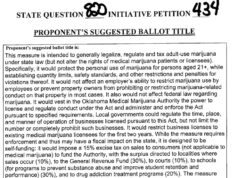Sometimes, I read the news and forget what month and/or year it is.
That happened this week when I clicked Oklahoma Watch’s story, “Bill Increasing Pay for Retired Teachers Draws Mixed Support.”
What? Wasn’t this proposed in at least a dozen different bills filed last session?
With the 2015-2016 school year already underway despite massive teacher shortages, why is this proposal in the news now? If it is a good idea, why was it not considered more strongly last session?
The context is puzzling — almost as perplexing as the state’s (arguably) top investigative-journalism group capitalizing nearly every word in its headlines. But ignore that for now. Here’s the lede from Oklahoma Watch:
A Republican plan to address Oklahoma’s unprecedented teacher shortage by giving retired teachers a $3,000 pay raise drew mixed reactions from educators and advocates Tuesday.
The plan calls for paying teachers $18,000 if they return to the classroom within the first three years of retirement while still receiving their pension benefits. That’s up from the $15,000 cap currently in place.
Yes, state Rep. Randy McDaniel (R-Edmond) is the author of HB 1061, a shell bill he filed for the 2015 legislative session that had been titled the “Business Employment and Transparency Act.”
A shell bill is a piece of placeholder legislation that often includes only its title. Shells are kept around the Legislature like a spare car on the farm: When a vehicle for some idea or another is needed, a shell bill can carry the load.
Hence, McDaniel’s proposal of a “new” HB 1061 for the 2016 session is the same sort of proposal he admits his House committee didn’t hear this spring owing to costs:
McDaniel, chairman of the business, labor and retirement laws committee, said similar bills were introduced last year but were not considered because of their fiscal impact on the pension system. Some of those bills increased the cap while others removed it.
(…)
“Demographics are impacting the situation causing record numbers of the most experienced teachers to retire,” McDaniel said in a press release.
Ah, there it is: a press release. Now we have our context.
It’s September 2015 — nearly five months before the 2016 session and about 13 months before Rep. McDaniel’s final legislative re-election campaign — and someone is seeking to generate headlines.
And lookee … it’s working. McDaniel sent his version of this already-proposed proposal to the state actuary on Wednesday, and the Edmond Sun ran a “Special to the Sun” recap of the hoopla the same day, without a byline.
Their headline? “House Committee unanimously agrees to advance bill lessening national teacher shortage impact on Oklahoma schools.”
That’s a nice headline for the politicians, but it implies far more has been done than just sending a proposal to the state’s top arithmetic gurus.
The proposal’s price tag will remain a mystery until 2016, and, even then, it’s fully unclear whether the state can afford it or whether more than a handful of retired teachers — less than 36 months removed from hanging up the smartboard — would be enticed back into the classroom.
So just remember, before you read a news story and come away thinking elected officials are actively addressing a problem facing the state, look for the context.
In this instance, the non-consideration of HB 1111, HB 1112, HB 1270, HB 1364, HB 1461, HB 1489, HB 1638 and HB 1782 last session should imply that the “new” HB 1061 won’t be a quick or substantial fix to a major state problem.
And I didn’t even list the 2015 Senate bills filed on the same topic.
Finally, if you’re looking for an existing state initiative intended to recruit and maintain quality teachers, perhaps review the Teacher Shortage Employment Incentive Program. After five years of teaching math or science, the state will reimburse some of an instructor’s student loans.
Maybe that should get some headlines.






















